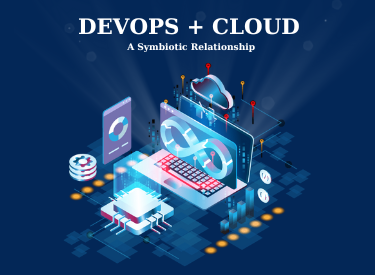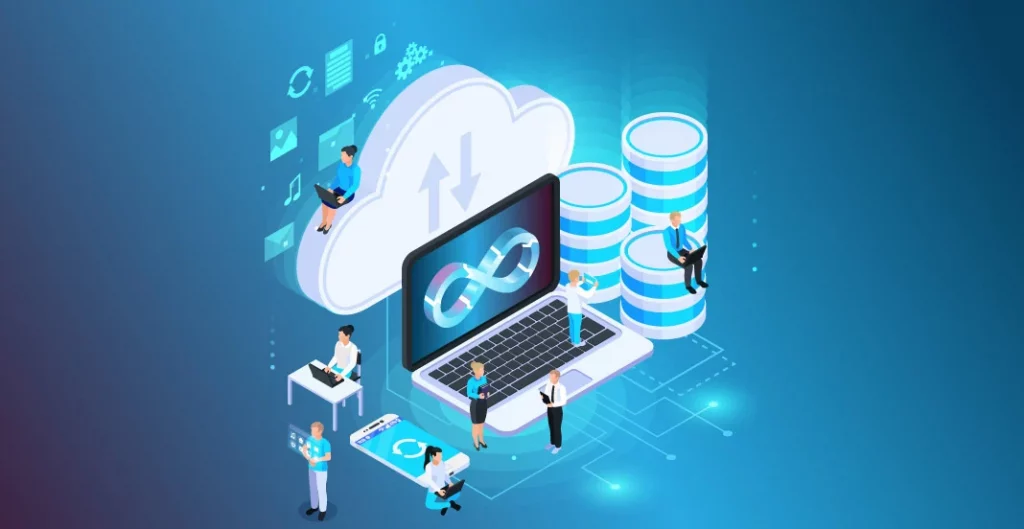A Symbiotic Relationship Between DevOps and Cloud

Every day, software development teams look for improved tools, strategies, and approaches for creating and deploying the finest technologies. The cloud provides a flexible and scalable road to success for many of today’s most imaginative entrepreneurs. It offers innovative security, automation, and growth options. Integrating DevOps and cloud allows businesses to compete more effectively in a complex and ever-changing economy. Rather than reinventing DevOps, the key to effective cloud integration is to execute and implement best engineering practices.
This frequently entails changing the underlying architecture and modernizing an environment in preparation for cloud redeployment. Today, we’ll talk about what it means for modern businesses to shift DevOps to the cloud.
Read more: Top 10 DevOps Trends to Watch 2022
What is the relationship between DevOps and Cloud?
In the world of an agile business, both cloud and DevOps have several advantages. Cloud technology allows companies to access infinite features and solutions at their own pace. Cloud technology simplifies upgrading and improving features in any setting quickly.
Similarly, DevOps promotes an agile workplace for all parties involved. Both methods offer advantages in terms of speed and production. However, when the cloud and DevOps combine their capabilities, they provide an even more enticing solution.
Clouds are developed and designed in such a way that they can fully utilize all DevOps approaches. The cloud provides tools for centralized deployments and DevOps assistance. According to David Linthicum, Chief Cloud Strategy Officer of Deloitte Consulting, DevOps is one of the primary factors now dictating the direction of cloud development.
At its heart, DevOps is the automation of agile methodology. The goal is to enable developers to respond to business demands in real-time. In other words, DevOps should eliminate much of the delay around software development for years.
The link between DevOps and cloud computing is easy to explain:
- Cloud computing’s centralized nature enables DevOps automation with a uniform, centralized platform for testing, deployment, and production. Historically, the dispersed nature of several corporate systems clashed with centralized software distribution. Many problems with dispersed complexity can be solved by using a cloud platform.
- DevOps automation is shifting to the cloud. Most public and private cloud computing providers systemically support DevOps on their platforms, including continuous integration and development tools. This close connection reduces the expense of on-premises DevOps automation technologies while providing centralized governance and control for a successful DevOps process. Many developers who enter the process discover that administration keeps them out of problems, and it’s simpler to administer this centrally via the cloud rather than attempting to regulate departments.
- The use of cloud-based DevOps reduces the requirement to account for resources used. Clouds employ consumption-based accounting, which records resource utilization by program, developer, user, data, etc. This service is often not provided by traditional systems. When using cloud-based resources, it is easier to track development resource expenses and make necessary adjustments.
Read more: DevOps and Agile: How to Agile & DevOps Interrelated
The Advantages of Cloud-Based DevOps
Why do people use DevOps as a key technology that helps them move to the cloud? Many businesses haven’t been able to grow because they haven’t been able to simplify and speed up the development process. There are a lot of stories about business leaders who can’t buy companies or launch new products because IT can’t keep up with the application development backlog.
While enterprise leaders try to fix their application development processes by switching from waterfall to DevOps, they know that DevOps alone won’t save them. Even if development is made agile, the time it takes to buy hardware and software as capital slows it down. Developers must wait for capital resources to be set up before deploying applications.
Therefore, DevOps is worthless without the cloud and vice versa. This fact is being recognized within organizations that previously believed they could migrate to one another without reliance. We’re discovering that there are certainly linkages between DevOps and cloud.
DevOps and cloud solutions work well together in an environment built for agility and flexibility, they can make a big difference in how software is produced. When DevOps is used in the cloud, software delivery performance can improve by an average of 81% for companies that use it.
In one study, over 900 IT professionals worldwide were asked how they do well in the current environment. Those who used DevOps on their own saw their performance increase by 52%. Those who used cloud by itself saw their performance increase by 53%. But the performance of the companies that used both went up by 81%.
The following are the primary advantages:
Cloud-Centric automation options
Automation is a critical tool for improving DevOps efficiency. Many cloud platforms offer enhanced automation solutions for DevOps activities, such as CI/CD. CircleCI, Jenkins, GitLab, and Travis CI are all examples of such tools used for continuous integration. These technologies provide uniformity and speed while requiring minimal human intervention.
Centralized platform
The cloud gives companies a central place to test, deploy, monitor, and run their production workloads. It’s easier to keep track of everything when it’s all in the same place. Compliance and security are easier to handle when all your DevOps information is in the same place. This is also an excellent way to get more helpful business intelligence and insights.
Scalable infrastructure
The cloud is the best way to ensure that any infrastructure can be scaled up or down as needed without spending much time and money on systems. DevOps is a very efficient way to add new features, functions, and opportunities as your business grows because it can be scaled up. When you combine them, you can give your organization access to various ways to grow.
Agile development
The cloud can offer many staging and testing servers, so DevOps teams can wait until servers are free and available to keep working. Teams are more likely to try new things when DevOps is used throughout the cloud environment because builds can happen more quickly. Teams that use DevOps can quickly set up servers that work for them.
Time and steadiness
Cloud providers can take care of the platform’s management and maintenance as they focus on uptime and stability. IT companies don’t have to worry about these problems. Instead, they can focus on product development, which will lead to better product performance, a better user experience, and a faster time to market. The key to success is choosing a cloud and devops service provider that can give your business the good uptime you can count on.
Read more: How to Select a Best DevOps Service Provider
Approaching cloud app development
When making apps for the cloud, the changes need to start with the software engineers, not the CEO. Everyone in charge of the process should know the benefits of building cloud apps with modern DevOps tools. Those who aren’t on board will probably get in the way of progress and not know how to handle the problems that are bound to arise. (This process can be called “continuous correction.”)
Enterprise development shops are quick to choose a cloud platform, often before they set up a DevOps process and organization. However, DevOps and public and private cloud solutions should evolve at the same time. We need to use cloud and non-cloud DevOps automation tools to automate our agile processes. At the same time, we need to consider bringing these DevOps processes and automation into public and/or private clouds.
This is easier to say than to do since DevOps tools and cloud and devops services are so new. Since so many things depend on each other, you can’t do them in order. The method that seems to work best comprises the steps below.
- Define your development needs. Look at what you’re doing now and what you need to do in the future.
- Explain what the business case is. You’ll have to ask someone for money, so you must figure out the return on investment (ROI).
- Figure out what the first DevOps processes are. Remember that these processes will constantly change as we look at them, try them out, and learn from our mistakes.
- Figure out the first DevOps solution and how it will connect to the cloud platform or platforms. You can’t just say what DevOps tools are without knowing what platform or platforms they are meant for. DevOps processes, automation, culture, and the target platform must work well together. You need to figure out what to do and how to do it. This is where most businesses fail because so many new parts need to work together. They miss the mark when it comes to lost opportunities in the new cloud platforms that aren’t used for one reason or another.
- Consider your people. Everyone must be on board with DevOps drive cloud development. Because DevOps and cloud are both new, this appears to be a problem in many firms. Adopting both new pathways at the same time baffles typical developers who want to learn but want a lot of supervision. Training will not help you either. The developers must provide leadership, and there should be no doubt regarding the new methods, tools, platforms, and day-to-day practices.
- Explain CloudOps and how apps will work in the cloud. Operations are something that most developers don’t want to deal with. That can’t be the case with this new model. No longer can you throw code over a wall and hope for the best. DevOps and cloud should give developers better and new ways to see how their apps work. With this feedback, the cloud app can be made better.
How can control be improved with DevOps in cloud?
DevOps solutions in the cloud can do more than make teams more efficient and productive; they can also provide a more centralized and efficient environment for governance. This makes it possible to use more complicated deployment methods in the landscape. But it also means that developers participating in these processes will have less trouble with security and other problems.
Many DevOps professionals find it much easier to manage all of their processes from a single location in the cloud. With more control and a more app-specific infrastructure, it’s much easier for team members from all environments to take responsibility for different parts. Developers can also use tools and services in the cloud to automate some tasks and processes. Teams can speed up other development processes by using the code to manage and give out resources.
Develops on the cloud have a high level of automation that can often eliminate common mistakes made by humans by making things repeatable. Companies that use DevOps in the cloud can even set up different levels of infrastructure provisioning to be automated through self-service. This removes the need for IT operations to set up resources, and developers can try out other things to see what works faster and doesn’t.
At the same time, developers can build different versions of their solution, which helps them find ways to improve it. The DevOps environment in the cloud eliminates almost all of the long wait times and development times, making integration and deployment much faster.
One Last Thought
All cloud parts have become more popular over the past few years. Companies of all sizes can see that a cloud environment gives them the freedom and scalability they need to grow at their own pace. As cloud communications continue to grow, so does the cloud as a place for development and application management. This is especially true when your team can start to use the cloud for DevOps to its fullest.
Soon, you’ll realize that you’re using a wide range of DevOps practices to improve the efficiency of your whole team. When that happens, you can ensure that your team’s performance and efficiency go through the roof. With the right cloud and devops service provider to guide and help you, your DevOps team and the cloud can do anything you want.


